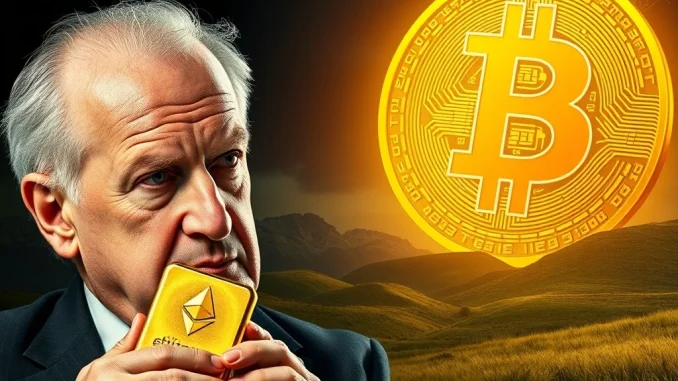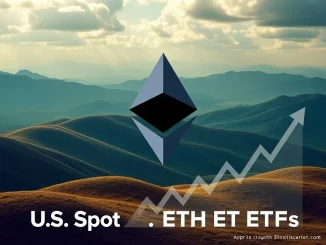
In a surprising twist that has sent ripples through the crypto community, Peter Schiff, the staunch gold advocate and vocal cryptocurrency skeptic, has offered an unexpected piece of advice. Known for his consistent bearish outlook on digital assets, Schiff recently took to X (formerly Twitter) to suggest a specific trade: to sell Ether (ETH) and buy Bitcoin (BTC) with the proceeds. This pronouncement from a figure who has long dismissed cryptocurrencies as speculative bubbles certainly raises eyebrows and prompts a deeper look into his rationale.
Peter Schiff Bitcoin: The Unexpected Endorsement?
For years, Peter Schiff, CEO of Euro Pacific Capital, has been a prominent voice against cryptocurrencies, often likening them to Ponzi schemes and asserting that gold remains the ultimate store of value. His stance has been unwavering, earning him the moniker ‘gold bug’ among crypto enthusiasts. So, when Schiff stated, “As much as it pains me to say, selling Ether and buying Bitcoin with the proceeds is a better trade than holding Ether,” it caught many off guard. This isn’t an endorsement of crypto in general, but rather a comparative assessment, suggesting that even within a market he despises, one asset might be less flawed than another.
Schiff’s history is filled with predictions of Bitcoin’s collapse, yet here he is, advising a strategic pivot within the crypto sphere. This isn’t a newfound love for Bitcoin; rather, it’s a calculated decision based on his perception of the relative weaknesses of Ethereum compared to Bitcoin. It underscores the ongoing debate about the long-term viability and use cases of different cryptocurrencies, even from the perspective of their staunchest critics.
Why Sell Ether? Schiff’s Rationale Unpacked
Schiff’s primary reason for advising investors to sell Ether is its ‘acknowledged competition for the narrative of its use case.’ This statement points to a crucial aspect of Ethereum’s ecosystem: its role as a foundational platform for decentralized applications (dApps), DeFi, and NFTs. While Ethereum pioneered many of these concepts, it now faces intense competition from a growing number of Layer 1 blockchains and scaling solutions. These competitors often boast lower transaction fees, higher throughput, or different consensus mechanisms, challenging Ethereum’s dominance.
Consider the following points that might contribute to Schiff’s perspective on Ether’s competitive landscape:
- Scalability Challenges: Despite the successful transition to Proof-of-Stake (PoS) with The Merge, Ethereum still grapples with high gas fees and network congestion during peak demand. This has led to the rise of alternative Layer 1s like Solana, Avalanche, and Binance Smart Chain, which offer faster and cheaper transactions.
- Evolving Narratives: Ethereum’s narrative has shifted from being just a ‘world computer’ to focusing on scalability solutions (Layer 2s like Arbitrum, Optimism) and modular blockchain architecture. While innovative, this complexity might be perceived as a vulnerability by skeptics who prefer simpler, more defined use cases.
- Regulatory Scrutiny: As a platform for various financial applications, Ethereum faces increasing regulatory attention, particularly regarding its PoS consensus and the potential classification of certain tokens as securities. This adds a layer of uncertainty that Bitcoin, often seen purely as a commodity, might avoid.
- Competition from within: Even within the Ethereum ecosystem, there’s competition from sidechains and Layer 2 solutions that aim to alleviate its core issues, potentially fragmenting its value proposition.
Schiff’s argument suggests that Ethereum’s multifaceted nature, while a strength for innovation, also makes it more susceptible to disruption and dilution of its core value proposition compared to Bitcoin’s more singular focus.
Buy Bitcoin: A Safer Bet in Schiff’s Eyes?
Despite his overall disdain for cryptocurrencies, Schiff’s recommendation to buy Bitcoin highlights what he perceives as its relative strengths. For someone who champions gold as the ultimate store of value, Bitcoin’s ‘digital gold’ narrative, while scoffed at by Schiff, perhaps holds a paradoxical appeal in a comparative sense. Bitcoin’s key attributes that might make it a ‘better trade’ in his eyes include:
| Attribute | Bitcoin (BTC) | Ethereum (ETH) |
|---|---|---|
| Primary Use Case | Digital store of value, peer-to-peer electronic cash. | Platform for dApps, DeFi, NFTs; ‘world computer’. |
| Supply Cap | Hard capped at 21 million coins. | No hard cap, but supply is deflationary under EIP-1559. |
| Competition | Limited, primarily other ‘digital gold’ narratives (e.g., Litecoin, though much smaller). | High, from other Layer 1s (Solana, Avalanche, BNB Chain) and Layer 2s. |
| Narrative Simplicity | Simple, clear, and widely understood. | Complex, evolving, and multifaceted. |
| Decentralization | Highly decentralized mining and node network. | Decentralization concerns post-Merge (validator concentration). |
Schiff’s preference for Bitcoin, however grudging, likely stems from its fixed supply, its status as the first and largest cryptocurrency, and its relatively simpler, more defined use case as a store of value. While he vehemently argues it’s not ‘real gold,’ he might see its limited supply and established network effect as less susceptible to the kind of competitive pressures and evolving narratives that he identifies in Ethereum.
Navigating the ETH vs BTC Debate: What’s Your Move?
Peter Schiff’s comments reignite the perennial ETH vs BTC debate, a fundamental discussion within the crypto space. While Schiff’s perspective is rooted in skepticism, it forces investors to consider the distinct value propositions of these two crypto giants. Bitcoin is often viewed as ‘digital gold,’ a hedge against inflation and a long-term store of value, appealing to those seeking a more conservative crypto exposure. Ethereum, on the other hand, is the engine of the decentralized internet, powering a vast ecosystem of innovation. Its value is tied to its utility and adoption as a platform.
For investors, the decision to buy Bitcoin or hold Ether (or both) depends on individual investment goals, risk tolerance, and understanding of each asset’s fundamentals. Diversification remains a key strategy in the volatile crypto market. Here are some actionable insights for navigating this complex landscape:
- Understand Your Goals: Are you looking for a long-term store of value (potentially BTC) or exposure to the burgeoning DeFi and NFT sectors (potentially ETH)?
- Research Beyond Headlines: Don’t rely solely on one opinion, even a provocative one like Schiff’s. Dive into the technical roadmaps, adoption rates, and competitive landscapes of both Bitcoin and Ethereum.
- Assess Risk: Both assets carry significant risk. Bitcoin’s volatility is well-known, while Ethereum’s evolving technology and competitive environment present different challenges.
- Consider Diversification: A balanced portfolio might include both BTC and ETH, recognizing their distinct roles and potential.
Schiff’s advice, while coming from a surprising source, serves as a reminder that even within the digital asset space, not all cryptocurrencies are created equal, and their long-term trajectories are subject to different market forces and competitive pressures.
Beyond Schiff: Broader Crypto Investment Advice
While Peter Schiff’s specific recommendation to sell Ether and buy Bitcoin is a noteworthy talking point, it’s crucial for any investor to approach the crypto market with a comprehensive strategy. The world of digital assets is dynamic, and sound crypto investment advice extends far beyond the opinions of individual commentators, no matter how influential. Key principles for navigating this space include:
- Due Diligence: Thoroughly research any asset before investing. Understand its technology, use case, team, community, and market position.
- Risk Management: Only invest what you can afford to lose. Cryptocurrency markets are highly volatile and subject to rapid price swings.
- Long-Term Perspective: While short-term trading can be tempting, many successful crypto investors adopt a long-term ‘HODL’ strategy, weathering market fluctuations.
- Security: Protect your assets. Use strong, unique passwords, enable two-factor authentication, and consider hardware wallets for significant holdings.
- Stay Informed: The crypto space evolves rapidly. Keep up with news, technological developments, and regulatory changes.
- Consult Professionals: For personalized financial planning, consider speaking with a qualified financial advisor who understands digital assets.
Schiff’s comments highlight the ongoing debate and diverse perspectives within finance. His specific trade recommendation, while controversial, encourages investors to think critically about the strengths and weaknesses of different digital assets.
Conclusion
Peter Schiff’s call to sell Ether and buy Bitcoin is a remarkable moment, not because it’s an endorsement of crypto, but because it represents a rare comparative analysis from one of its most ardent critics. It underscores the perceived fundamental differences between Bitcoin’s ‘digital gold’ narrative and Ethereum’s more complex, utility-driven ecosystem, which Schiff believes faces greater competition. While his advice comes from a place of overall crypto skepticism, it compels investors to re-evaluate their portfolios and consider the unique value propositions of these two leading cryptocurrencies. Ultimately, whether you choose to sell Ether, buy Bitcoin, or hold both, informed decision-making, based on thorough research and a clear understanding of your own investment goals, remains paramount in the ever-evolving world of digital assets.
Frequently Asked Questions (FAQs)
Q1: Why did Peter Schiff recommend selling Ether and buying Bitcoin?
Peter Schiff, a known gold bug and crypto skeptic, recommended selling Ether (ETH) and buying Bitcoin (BTC) because he believes Ether faces significant and ‘acknowledged competition for the narrative of its use case.’ He views Bitcoin as a ‘better trade’ comparatively, likely due to its simpler, more established ‘digital gold’ narrative and fixed supply, which he might see as less vulnerable to market shifts and new competitors.
Q2: Is Peter Schiff’s advice a sign that he is changing his mind about crypto?
No, Peter Schiff’s advice is not an endorsement of cryptocurrencies in general. He remains highly skeptical of digital assets, viewing them as speculative. His recommendation is a comparative assessment, suggesting that if one *must* engage with crypto, Bitcoin is a relatively less flawed option than Ethereum in his view, primarily due to what he perceives as Ethereum’s competitive challenges.
Q3: What are the main differences between Bitcoin (BTC) and Ethereum (ETH) that might influence investment decisions?
Bitcoin (BTC) is primarily viewed as a digital store of value, often called ‘digital gold,’ with a fixed supply of 21 million coins. Ethereum (ETH) is a decentralized platform that enables smart contracts and decentralized applications (dApps), powering the DeFi, NFT, and Web3 ecosystems. While Bitcoin’s narrative is simpler and more singular, Ethereum’s value is tied to its utility and adoption as a programmable blockchain, facing more direct competition from other Layer 1 networks.
Q4: Should I follow Peter Schiff’s advice to sell Ether and buy Bitcoin?
Investment decisions should always be based on your personal financial situation, risk tolerance, and thorough research. While Peter Schiff’s opinion is notable, it’s just one perspective. It’s crucial to understand the fundamentals of both Bitcoin and Ethereum, assess their potential risks and rewards, and consider diversifying your portfolio. Consulting with a qualified financial advisor is also recommended before making significant investment changes.
Q5: What does ‘acknowledged competition for the narrative of its use case’ mean for Ethereum?
This phrase refers to the increasing number of alternative blockchain platforms (Layer 1s like Solana, Avalanche, BNB Chain, etc.) and scaling solutions (Layer 2s) that offer similar or improved functionalities to Ethereum, often with lower fees or higher transaction speeds. This competition challenges Ethereum’s dominance as the leading platform for dApps, DeFi, and NFTs, potentially impacting its long-term value proposition as perceived by some critics like Schiff.



